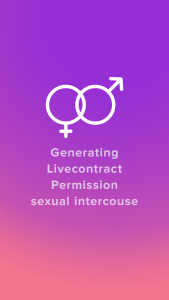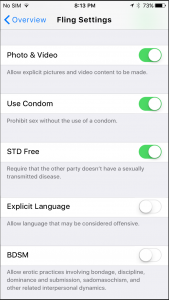I’ve been hearing a lot about Legal Fling lately, which is supposed to be a consent app. Now, I’m the first to admit that I’m getting older and I may not be as “cool” as I once was, but WTF?!?
Requesting Your Consent…
 Have you heard about this new, yet to be released app called Legal Fling? It allows you to send a request, kind of like how you send a friend request on Facebook, and obtain consent for sexual activity from your potential partner.
Have you heard about this new, yet to be released app called Legal Fling? It allows you to send a request, kind of like how you send a friend request on Facebook, and obtain consent for sexual activity from your potential partner.
You can customize the activities that you will engage in (but from the screenshots, it doesn’t look very detailed), the transaction hash (but not your name) is timestamped and stored in the blockchain, and you can escalate to sending a cease and desist or impose financial penalties on people who breach the contract.
It says that you can revoke consent at any time by tapping a button on the app. Don’t worry, the app assures us, even if things do go wrong, you have a legal contract to back you up.
Hopefully you will not be needing this further down the road. But just in case, feel safe knowing that there is a legally binding agreement. Any violation can be dealt with quickly and privately.
Does this sound kinda broken to anyone else?
Legally Binding?

Legal Fling claims that any agreements made through Legal Fling are a legal contract. It uses the Live Contract platform, which aims to bring the security of legally binding contracts to laypeople.
But wait, after receiving criticisms that this app can be abused by predators looking to escape responsibility for violating consent, the co-founder started making excuses. The critics say that a predator could obtain consent early in the night, then prevent the victim from revoking consent on the app, using it against them in the case of legal repercussions.
Co-founder of Legal Fling, Arnold Daniels, told critic Nadine Higgins;
“The contract on itself is not the consent and it’s not the proof that you have consent. The contract is about making the rules very clear.”
The “Rules” Aren’t Very Clear
 Looking at the options on Legal Fling that one can get consent for, they are very vague. Maybe this isn’t the finished product, perhaps the actual app will go into more detail, but as it stands from the promotional screenshots, there is a lot of room for things to go wrong.
Looking at the options on Legal Fling that one can get consent for, they are very vague. Maybe this isn’t the finished product, perhaps the actual app will go into more detail, but as it stands from the promotional screenshots, there is a lot of room for things to go wrong.
I am a bit disturbed that the request for photos and video is above (seemingly more important) than the request to wear a condom or STI status. It also doesn’t leave room for people to say things like “no face pictures” if they choose.
Asking that a user be STI free is asking for people to lie and claim ignorance. I wish that this app had a way to have an open and honest talk about STIs and the risks involved in transmitting them. People have different risk profiles that they are willing to accept. Some will say yes to sex with a person who has genital herpes if protection is used and the person doesn’t have active legions (the time when virus shedding is most likely). This app doesn’t leave room for nuance.
Furthermore, having BDSM as a wide-open category can be a dangerous one. I would hope that there is at least a checklist of different activities or something, but knowing how huge the world of BDSM is, it would be impossible to cover every possibility.
What if someone sees that I approve of BDSM and thinks “oh cool, I can spank her!” while I’m thinking, “Oh cool, I can stick a few hundred needles in his genitals (a personal favourite past-time)”. Both of us can say “but they consented to BDSM!” despite having drastically different ideas of what that might entail.
Don’t worry though, you can get consent from multiple people for group sex activities with Legal Fling, just choose the additional people from your contacts and wait for them to consent! I’m sure there won’t be any misunderstandings about who gets to fuck who or anything – after all, we’re all straight, right?
Power of Contracts
 Another issue that has been brought up is that signing a contract, even one on an app, has the feeling of being permanent. I mean, the name of the app is Legal Fling, it could be very intimidating to a lot of people who aren’t familiar with how the law works. I’m sure there are a lot of people who would use the “contract” to say that you agreed to sex, now you owe me sex.
Another issue that has been brought up is that signing a contract, even one on an app, has the feeling of being permanent. I mean, the name of the app is Legal Fling, it could be very intimidating to a lot of people who aren’t familiar with how the law works. I’m sure there are a lot of people who would use the “contract” to say that you agreed to sex, now you owe me sex.
The whole thing also ignores how consent actually works. If a person has changed their mind about a specific activity or the whole encounter, they may not be able to swipe the “no” or cancel option on the app. They may not feel safe outright saying no, and will simply give excuses to try to leave. These soft no’s may be intentionally ignored (just like they are now) with the excuse that the person didn’t revoke consent on the app.
Furthermore, one of the big issues with using the blockchain to store information is that it’s permanent. This article on Motherboard gives an easy to understand and well-argued explanation of why this is a problem.
Will it Stand Up in Court?
Of course, there is nothing saying that courts will admit the contract generated by this app in court, should a situation get that far. The app warns about this in their FAQ;
The application generates a Live Contract, which is a legally binding agreement. Just remember, the app is about setting clear rules and boundaries, not breaking them. To which extent the contract holds up in court depends on your country of residence.
So all this sending of requests may be pointless. In the end, it may turn out that communication the old fashioned way is the only way to proceed. That is assuming that Legal Fling even gets approved by Android and Apple in the first place. They are still working on getting that bit of consent dealt with.
Want to learn about consent and negotiation in BDSM? Check out these articles and videos:
Negotiation Checklist
#1 Rule in BDSM
How to Negotiate in BDSM
Limits & Boundaries
Safe Words
Kinky Consent